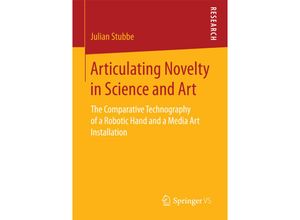Julian Stubbe aims at characterizing what novelty is in the becoming of objects and how the new
becomes part of a shared reality. The study's method is comparative and concerned with
technological practice in science as well as in art. It draws on a detailed comparison of two
cases: the becoming of a robotic hand made from silicone and the genesis of a media art
installation that renders visible changes in the earth's magnetic field. In contrast to the
canon of sociological innovation studies which regard novelty as what actors in the field
label as new or innovation the author attempts to delineate certain shifts in an object's
becoming that individuate an object and render its difference visible. This entails attending
the enactment of novelty through cultural imaginaries and narratives about technologies as
well as acknowledging the shifts in technical forms that make loose elements enter a new kind
of circularity. From this perspective novelty is an articulation: when differences are not
contradicting but when differing characteristics are aligned fitted and click in so as to
appear and behave as a distinct entity.



